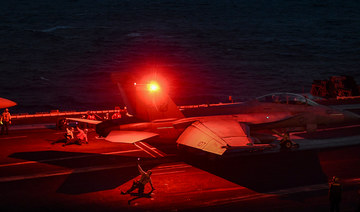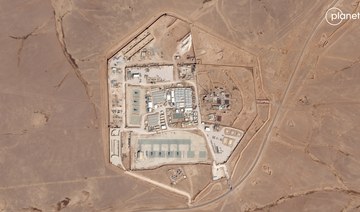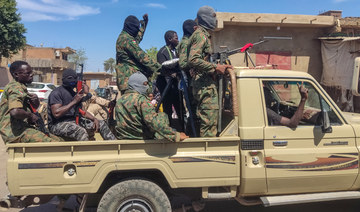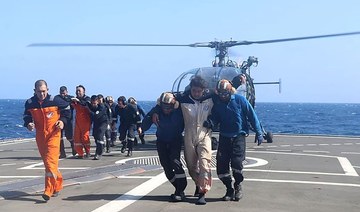DAMASCUS: Deadly US strikes on Iran-backed forces in Syria and Iraq drew sharp condemnation from the region Saturday, after President Joe Biden vowed further action in retaliation for a deadly attack on American troops.
The United States, whose late Friday strikes killed 45 people, blamed Sunday’s drone attack that hit a US base in Jordan on militants backed by Tehran.
US forces however did not strike inside Iranian territory, with both Washington and Tehran seemingly keen to avoid all-out war.
But with tensions already running high in the face of the Israel-Hamas war in Gaza, both the Syrian and Iraqi governments joined Tehran in accusing Washington of undermining regional stability.
National Security Council spokesman John Kirby said US warplanes struck “more than 85 targets at seven facilities,” four in Syria and three in Iraq.
“These targets were carefully selected to avoid civilian casualties,” he added.
But the Iraqi government said civilians were among at least 16 people killed in the country’s west, and Damascus also reported civilian deaths, but a war monitor said all 29 killed in the US strikes on Syria were fighters.
“This aggressive air strike will push the security situation in Iraq and the region to the brink of the abyss,” said Iraqi government spokesman Bassem Al-Awadi.
Iraqi Prime Minister Mohamed Shia Al-Sudani declared three days of mourning, while the foreign ministry said Washington’s charge d’affaires in Baghdad was handed a formal protest over the strikes.
Iranian foreign ministry spokesman Nasser Kanani said the overnight strikes would “have no result other than intensifying tension and instability.”
Hamas, whose unprecedented October 7 attack on Israel sparked the current spiral of violence in the region, accused Washington of pouring “oil on the fire.”
Meanwhile, diplomatic sources said the UN Security Council would convene Monday, after Russia called for a meeting “over the threat to peace and safety created by US strikes on Syria and Iraq.”
The Syrian foreign ministry said the strikes served to “inflame the conflict in the Middle East.”
The Syrian army said “a number of civilians and soldiers” were killed in eastern Syria, but the Syrian Observatory for Human Rights monitor reported no civilian deaths.
The Britain-based Observatory said the strikes killed 29 pro-Iran fighters, including at least six from Lebanese Hezbollah.
The Lebanese group condemned the US operation, saying it “contributes to heightening conflict, tensions and escalation” across the region.
The Observatory earlier said some militant groups had begun evacuating their positions and civilians in the towns of Deir Ezzor and Mayadeen had fled their homes in fear of more US strikes.
Syria’s culture ministry condemned a “barbaric” strike on Deir Ezzor province that local media said had damaged a ninth-century citadel.
Biden said the overnight strikes were only a beginning. “Our response... will continue at times and places of our choosing,” the US president said.
Washington said it had informed Baghdad “prior to the strikes,” drawing an angry denial from the Iraqi government spokesman who called it an “unfounded claim crafted to mislead international public opinion.”
Tensions between the two governments have deepened in recent months after Washington carried out previous air strikes in response to a flurry of attacks on US-led troops since the Gaza war began in October.
Washington and Baghdad opened talks on the future of the US-led troop presence late last month after repeated demands from Sudani for a timetable for their withdrawal.
The United States has some 900 troops in Syria and 2,500 in Iraq as part of an international coalition against the Daesh group.
Its troops in Iraq are deployed at the invitation of Baghdad, but those in Syria are deployed in areas outside government control.
The Syrian military demanded on Saturday that Washington withdraw its troops.
“The occupation of parts of Syrian territory by US forces cannot continue,” it said.
Analysts said the US strikes were unlikely to stem the flurry of attacks on US targets sparked by American support for Israel in its war on Hamas.
The strikes represent a “significant escalation,” said Allison McManus, of the Center for American Progress think tank, but “we have not seen that similar tit-for-tat strikes have had a deterrent effect.”
Al-Nujaba, an Iraqi group part of a pro-Iran alliance blamed by Washington for numerous attacks on its forces, vowed a response.
In a statement, the group warned “the US occupation... that the Islamic resistance will respond in the manner it deems appropriate, at the time and place of its choosing, and that this is not the end.”
US and coalition troops have been attacked more than 165 times in Iraq, Syria and Jordan since mid-October.
The soldiers killed Sunday were the first American military deaths from hostile fire in the upsurge of violence.
US reprisals against Iran-linked groups anger Iraq, Syria
https://arab.news/rr2qu
US reprisals against Iran-linked groups anger Iraq, Syria
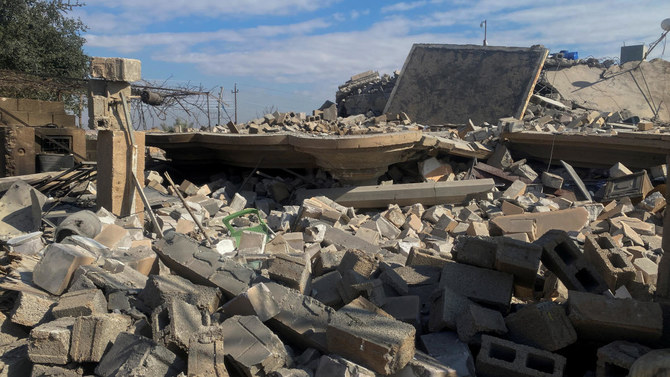
- Strikes late Friday strikes killed 45 people
- President Joe Biden vowed further action in retaliation for deadly attack on US troops
Turkiye halts all trade with Israel, cites worsening Palestinian situation

- Turkiye’s trade ministry: ‘Export and import transactions related to Israel have been stopped, covering all products’
- Israel’s FM Israel Katz said that Turkish President Tayyip Erdogan was breaking agreements by blocking ports to Israeli imports and exports
ANKARA: Turkiye stopped all exports and imports to and from Israel as of Thursday, the Turkish trade ministry said, citing the “worsening humanitarian tragedy” in the Palestinian territories.
“Export and import transactions related to Israel have been stopped, covering all products,” Turkiye’s trade ministry said in a statement.
“Turkiye will strictly and decisively implement these new measures until the Israeli Government allows an uninterrupted and sufficient flow of humanitarian aid to Gaza.”
The two countries had a trade volume of $6.8 billion in 2023.
Turkiye last month imposed trade restrictions on Israel over what it said was Israel’s refusal to allow Ankara to take part in aid air-drop operations for Gaza and its offensive on the enclave.
Earlier on Thursday, Israel’s foreign minister said that Turkish President Tayyip Erdogan was breaking agreements by blocking ports to Israeli imports and exports.
“This is how a dictator behaves, disregarding the interests of the Turkish people and businessmen, and ignoring international trade agreements,” Israel’s Foreign Minister Israel Katz posted on X.
Katz said he instructed the foreign ministry to work to create alternatives for trade with Turkiye, focusing on local production and imports from other countries.
Palestinian groups say top Gaza surgeon died in Israeli custody

- Dr. Adnan Ahmed Atiya Al-Barsh died at the Israeli-run Ofer prison in the West Bank last month: advocacy groups
- Latest deaths brought to 18 the number of deaths in Israeli custody since the war began on October 7, groups said
RAMALLAH, Palestinian Territories: Palestinian advocacy groups said Thursday that the head of orthopedics at Gaza’s largest hospital Al-Shifa has died in Israeli custody, alleging he had been tortured during his detention.
Dr. Adnan Ahmed Atiya Al-Barsh died at the Israeli-run Ofer prison in the occupied West Bank last month, the Palestinian Prisoners Affairs Committee and the Palestinian Prisoners Club said in a joint statement.
Contacted by AFP about the reported death in custody, the Israeli army said: “We are currently not aware of such (an) incident.”
Barsh, 50, had been arrested with a group of other doctors last December at Al-Awda Hospital near the Jabalia refugee camp in northern Gaza.
He died on April 19, the prisoners groups said, citing Palestinian authorities.
“His body is still being held,” they added.
The groups said they had also learnt that another prisoner from Gaza, Ismail Abdel Bari Rajab Khadir, 33, had died in Israeli custody.
Khadir’s body was returned to Gaza on Thursday, as part of a routine repatriation of detainees by the army through the Kerem Shalom border crossing, the groups said, citing authorities on the Palestinian side of the crossing.
The groups said evidence suggested the two men had died “as a result of torture.”
They alleged that Barsh’s death was “part of a systematic targeting of doctors and the health system in Gaza.”
The health ministry in Hamas-ruled Gaza said the surgeon’s death amounted to “murder,” adding that it brought to 492 the number of health workers killed in Gaza since the war erupted nearly seven months ago.
The prisoners groups said the latest deaths brought to 18 the number of deaths in Israeli custody since the war began on October 7.
There have been repeated Israeli military operations around Gaza’s hospitals that have caused heavy damage.
Medical facilities are protected under international humanitarian law but the Israeli military has accused Hamas of using Gaza’s hospitals as cover for military operations, something the militant group denies.
The Al-Shifa hospital, where Barsh worked, has been reduced to rubble by repeated Israeli military operations, leaving what the World Health Organization described last month as an “empty shell.”
The war started with an unprecedented Hamas attack on southern Israel that resulted in the deaths of 1,170 people, mostly civilians, according to an AFP tally of Israeli official figures.
Israel estimates that 129 captives seized by militants during their attack remain in Gaza. The military says 34 of them are dead.
Israel’s retaliatory offensive against Hamas, has killed at least 34,596 people in Gaza, most of them women and children, according to the health ministry.
Lebanon urged to conclude working arrangement with EU border agency to prevent illegal migration
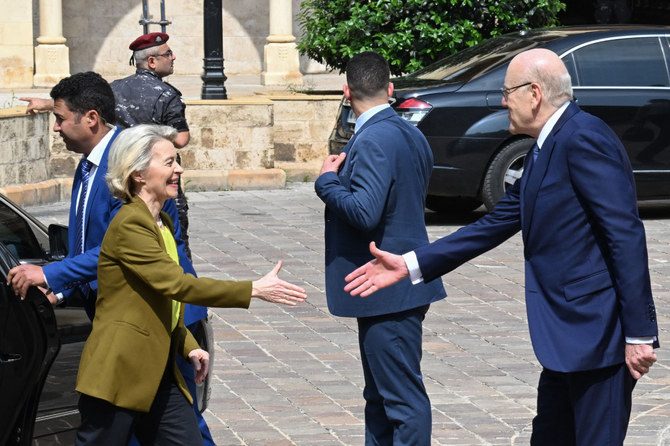
- Berri: Lebanon ready to discuss implementation of UN Resolution 1701 after Gaza aggression ends
- The EU assistance is tied to Lebanon’s need to implement the required reforms and control its borders and illegal crossings with Syria
BEIRUT: The EU has announced an aid package for Lebanon of 1 billion euros ($1.06 billion) to help boost border control and halt the flow of asylum-seekers and migrants from the country across the Mediterranean Sea to Cyprus and Italy.
It comes against a backdrop of increasing hostility toward Syrian refugees in Lebanon and a major surge in irregular migration of Syrians from Lebanon to Cyprus.
The UN High Commissioner for Refugees, meanwhile, has decided to reduce healthcare coverage for registered Syrian refugees by 50 percent.
EU Commission President Ursula von der Leyen said during her visit to Beirut with Cypriot President Nikos Christodoulides that they hoped Lebanon would conclude a “working arrangement” with Frontex, the EU’s border agency.
Von der Leyen said the aid’s distribution will start this year and continue until 2027.
The aid will be dedicated to the most vulnerable people, including refugees, internally displaced people, and host communities.
The EU assistance — which is tied to Lebanon’s need to implement the required reforms and control its borders and illegal crossings with Syria — came in the wake of continued hostilities on the southern front between Hezbollah and the Israeli military.
The two officials arrived in Beirut following the European Council’s special meeting last month.
At the end of the meeting, the council confirmed the EU’s “determination to support the most vulnerable people in Lebanon, strengthen its support to the Lebanese Armed Forces, and combat human trafficking and smuggling.”
It also reaffirmed “the need to achieve conditions for safe, voluntary and dignified return of Syrian refugees, as defined by UNHCR.”
The visit lasted hours in Lebanon and included a meeting with caretaker Prime Minister Najib Mikati and Parliament Speaker Nabih Berri.
Following a tripartite meeting and an expanded discussion in which ministers and security officials participated, Mikati commended the EU’s understanding of the Lebanese state’s demand to reconsider some of its policies regarding assistance to Syrian refugees in the country.
Mikati said: “Lebanon has borne the greatest burden, but it can no longer endure the current situation, especially since the refugees constitute around one-third of Lebanon’s population, which results in additional difficulties and challenges and exacerbates Lebanon’s economic crisis.”
He added: “What is more dangerous is the escalating tension between Syrian refugees and the Lebanese host community due to the crimes that are increasing and threatening national security.”
Mikati emphasized that “Lebanon’s security is security for European countries and vice versa,” adding that “our cooperation on this matter constitutes the real entry point for stability.”
He added: “We refuse to let our country become an alternative homeland, and everyone knows that the solution is political excellence.”
Mikati called for the EU and international actors to recognize that most Syrian areas have become safe, which would facilitate the refugees’ repatriation and allow them to be supported in their home country.
As a first step, those who entered Lebanon in 2016 must go back, as most of them fled for economic reasons and are not considered refugees, said Mikati.
He warned against “turning Lebanon into a transit country to Europe,” saying that “the problems occurring on the Cypriot border are a sample of what might happen if the matter was not radically addressed.”
Von der Leyen, the first European Commission president to visit Lebanon, affirmed her “understanding of the Lebanese position.”
She said: “We want to contribute to Lebanon’s socio-economic stability by strengthening basic services and investments in, for example, education, social protection, and health for the people of Lebanon.
“We will accompany you as you take forward economic, financial, and banking reforms.
“These reforms are key to improving the country’s long-term economic situation. This would allow the business environment and the banking sector to regain the international community’s trust and thus enable private sector investment.”
The EU official said that the support program for the Lebanese military and other security forces “will mainly focus on providing equipment, training and the necessary infrastructure for border management.
“In addition, it would be very helpful for Lebanon to conclude a working arrangement with Frontex, particularly on information exchange and situational awareness.”
She continued: “To help you manage migration, we are committed to maintaining legal pathways open to Europe and resettling refugees from Lebanon to the EU.
“At the same time, we count on your cooperation to prevent illegal migration and combat migrant smuggling.”
Von der Leyen said: “We will also look at how we can make the EU’s assistance more effective. This includes exploring how to work on a more structured approach to voluntary returns to Syria, in close cooperation with UNHCR.”
She also stressed that the international community should strengthen support for humanitarian and early recovery programs in Syria.
Von der Leyen added: “We are deeply concerned about the volatile situation in southern Lebanon, and believe that the security of both Lebanon and Israel cannot be disassociated.
“So, we call for the full implementation of UN Security Council Resolution 1701.
“This needs to be part of a negotiated diplomatic settlement. The Lebanese armed forces are critical here, too, and the EU is ready to work on bolstering their capabilities.”
Christodoulides said that European assistance, which also includes “combating smuggling and managing borders and monitoring them,“ would “enhance the Lebanese authorities’ ability to confront various challenges such as monitoring land and sea borders, ensuring the safety of citizens, combating human trafficking, and continuing counterterrorism efforts.”
The Cypriot president said the “reverberations of the issues and challenges” that Lebanon was facing directly affected Cyprus and the EU.
“We need to work with our partners and UNHCR to discuss the issue of voluntary returns and reconsider the situation of some areas in Syria.”
He emphasized that Lebanon must implement the “necessary and deep reforms in line with the International Monetary Fund’s demands and address issues of accountability, and Cyprus will support Lebanon’s efforts to elect a new president, a development that will send a strong political and symbolic message for change and moving forward.”
Parliament Speaker Berri told the European official that Lebanon “does not want war, and since the moment the Israeli aggression began, it has remained committed to the rules of engagement, which Israel continues to violate, targeting the depth of Lebanon, not sparing civilians, media personnel, agricultural areas, and ambulances, using internationally banned weapons.”
Berri said that Lebanon, “while awaiting the success of international efforts to stop the aggression on the Gaza Strip, which will inevitably reflect on Lebanon and the region, will then be ready to continue the discussion on the implementation of UN Resolution 1701, to which Lebanon was and still is committed and adheres.”
Berri urged “the concerned parties to engage with the Syrian government, which now has a presence over most of its territories, in addressing the refugee issue.”
Red Cross says gunmen kill two of its drivers in Sudan
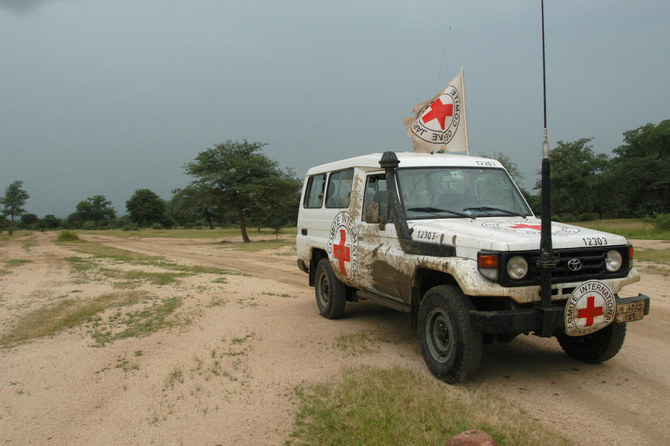
- The team was on its way back from Layba to assess the humanitarian situation of communities affected by armed violence
- “We are in deep mourning for our dear colleagues,” said Pierre Dorbes, head of the ICRC delegation in Sudan
GEENVA: Gunmen killed two drivers working for the International Committee of the Red Cross in war-torn Sudan on Thursday and injured three other staff, the ICRC said.
“The team was on its way back from Layba to assess the humanitarian situation of communities affected by armed violence in the region when the incident occurred” in South Darfur, the ICRC said in a statement.
“We are in deep mourning for our dear colleagues. We extend our sincere condolences to their families, and we hope for a speedy recovery for our injured co-workers,” said Pierre Dorbes, head of the ICRC delegation in Sudan.
A brutal conflict between the Sudanese army led by General Abdel Fattah Al-Burhan and the paramilitary Rapid Support Forces of his ex-deputy Mohamed Hamdan Dagalo has torn the country apart for more than a year.
The war has killed tens of thousands of people and forced millions more to flee their homes in what the United Nations has called the “largest displacement crisis in the world.”
It has also triggered acute food shortages and a humanitarian crisis that has left the northeast African country’s people at risk of starvation.
Houthi leader vows ‘fourth phase’ of Red Sea ship attacks
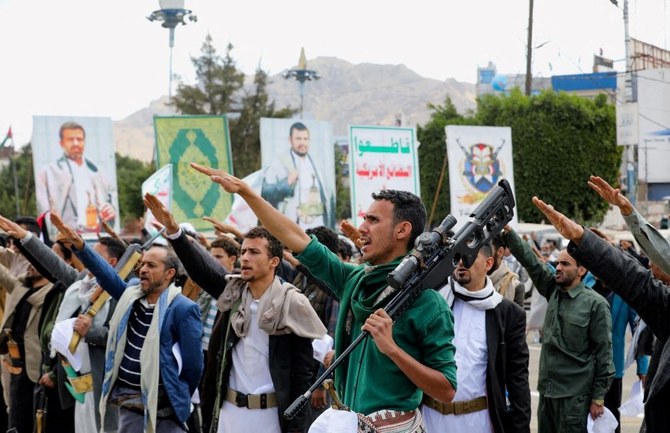
- Abdul Malik Al-Houthi: ‘We are preparing for a fourth round of escalation if the Israeli enemy and the Americans continue their intransigence’
- Al-Houthi said that 452 attacks by US and UK armies on militia-controlled regions had killed 40 people and injured 35 others since January
AL-MUKALLA: The leader of the Houthi militia vowed to escalate attacks on ships in the Red Sea until Israel ends its war in Gaza and the US stops attacking Yemen.
“We are preparing for a fourth round of escalation if the Israeli enemy and the Americans continue their intransigence,” Abdul Malik Al-Houthi said in a televised speech on Thursday.
Al-Houthi said that his forces launched 606 ballistic missiles and drones against 107 Israeli, US, and UK ships in the Red Sea, Bab Al-Mandab Strait, Gulf of Aden, and recently in the Indian Ocean during the Red Sea ship campaign that began in November.
In the last seven days alone, the Houthis have fired 33 ballistic missiles and drones at six ships in international seas off Yemen’s coast, as well as Israel’s city of Eilat.
Al-Houthi said that 452 attacks by US and UK armies on militia-controlled regions had killed 40 people and injured 35 others since January.
His warning came after the militia’s media said on Thursday that the US and UK carried out five airstrikes on Hodeidah airport in the Red Sea’s western city of Hodeidah.
On Tuesday, the US carried out another strike on the port of Al-Saleef in Hodeidah after the US Central Command reported its troops stopped a Houthi assault with a drone boat on the same day.
The Houthis have seized a commercial ship, sunk another, and launched hundreds of missiles and drones at international navy and commercial ships in the Red Sea since November, claiming to be in support of Palestinians and pressuring Israel to cease its war in Gaza.
As a response to the attacks, the US formed a coalition of marine forces to protect the Red Sea.
It also launched strikes on Houthi targets in Sanaa, Saada, Hodeidah, and other Yemeni areas controlled by the Houthis.



